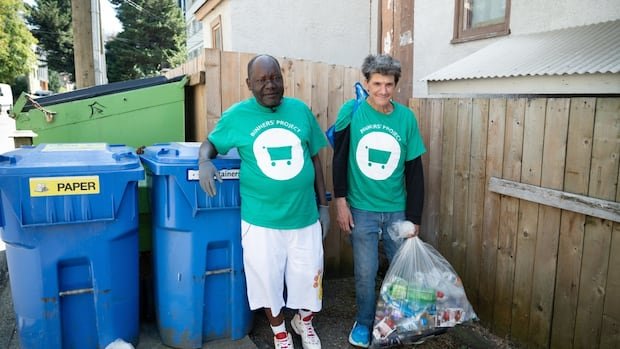Grant Kilian is efficient in his work, swiftly navigating through the towering blue recycling bins in the alleys of Vancouver’s West End. Time is of the essence, as each can he collects translates to money. The quicker he fills a bag, the sooner he can exchange them for cash at the return depot. A sizable garbage bag filled with beer cans, some flattened for space, can yield Kilian around $30 in untaxed income.
For Kilian, this extra cash means the ability to cover basic needs like food, bills, or cigarettes during financially tight times. He prides himself on the honesty of his work, emphasizing that he avoids criminal activities and theft. With his expertise, he can earn $50 to $60 in just a couple of hours.
Kilian belongs to a community known as “binners,” individuals who collect redeemable items from trash cans to make a living and reduce waste in landfills. According to the Binners Project, the number of people scavenging for recyclables in Vancouver has grown significantly, especially during the warmer months when empty beverage containers are abundant.
Francis Taban, who has been a binner for 12 years and now works at the Binners Project, notes the increasing appeal of binning to newcomers. Economic challenges, job losses, and rising living costs have driven more individuals to explore this avenue for additional income. The reality of financial struggles is deeply felt, particularly among low-income earners, as highlighted by Lars Osberg, an economics professor at Dalhousie University.
Statistics Canada data underscores the widening income disparity in Canada, with the lowest-income households experiencing the weakest wage growth. Reports indicate that a significant portion of British Columbians do not earn a living wage, further emphasizing the economic hardships faced by many Canadians.
Osberg suggests that targeted policies focusing on income support could help alleviate these financial burdens. Binning offers a low-entry opportunity to earn extra income and improve one’s quality of life. With just time and a receptacle for cans or bottles, more individuals are drawn to this alternative source of income, contributing to the competitive nature of binning in certain areas of Vancouver.
While the potential to earn $100 to $120 a week by diligently searching through bins exists, Taban emphasizes the physical toll and challenges of the job. Carrying heavy bags of cans and bottles, often emitting unpleasant odors, is demanding work. Despite its difficulties, binning remains a viable option for those seeking to supplement their income in the face of economic uncertainties.

